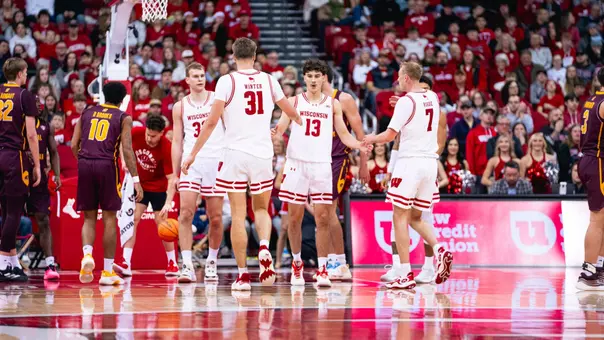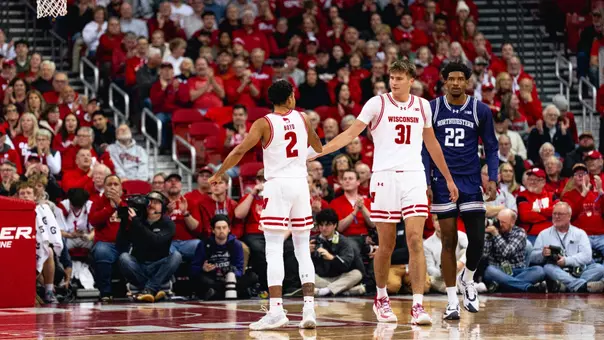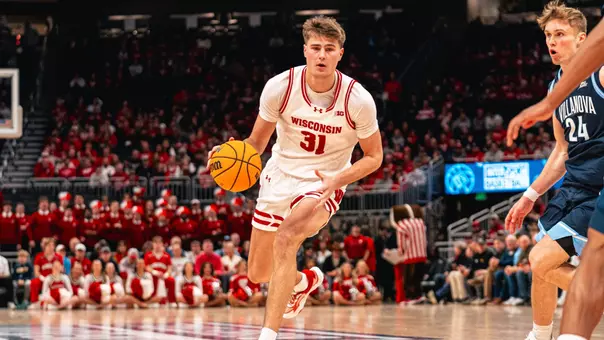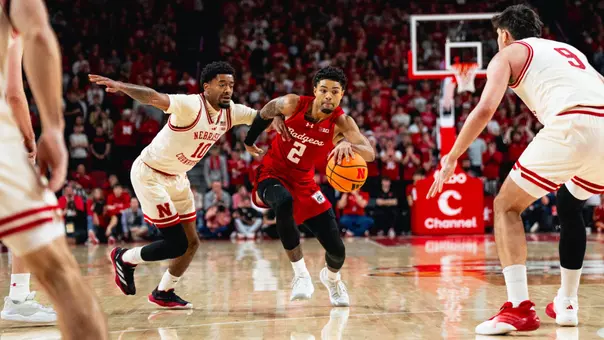
Coach versus cancer: fundraising for research has become Bo Ryan's crusade
October 12, 2015 | Men's Basketball, Mike Lucas
Fundraising for cancer research has become Bo Ryan's crusade
 | ||
|
BY MIKE LUCAS
UWBadgers.com Senior Writer
Twenty minutes after the topic had been broached – on when cancer had first entered his consciousness as a teenager growing up in Chester, Pennsylvania, and then later as a young basketball coach working is way up the ladder – Bo Ryan slowly began to lower his guard.
Measuring his words on how cancer has touched people closest to him recently, Ryan nodded in the direction of the open door and the hallway leading to the office of his trusted friend, longtime assistant and associate head coach, Greg Gard, who has been at his side since 1993.
"Do you know about Greg's dad?" he asked softly.
Glen Gard, 72, has been undergoing cancer treatment.
"Our staff has been very supportive and Bo has been terrific in terms of saying to me, 'Do what you need to do and we'll do whatever we can to help you,'" Greg Gard said. "The same thing with Henry (Perez-Guerra, the team's athletic trainer). He has been a great resource.
"Along the way, I've had a lot of support and I'm grateful for that. I've tried to help quarterback decisions, so to speak, and help my parents navigate. It's a roller coaster; it's something that until it hits you directly with someone you're close to, you don't understand the impact that it can have."
Glen and Connie Gard live about an hour from Madison in the tiny village of Cobb where Greg was raised with his two brothers, Gary and Jeff, the head basketball coach at UW-Platteville.
Greg and his wife Michelle have been juggling their schedule around clinic appointments for Glen, including a recent trip to see a specialist in Ohio.
A week ago, Greg and Jeff flew to Cleveland in the morning, accompanied their parents back to Wisconsin, and practiced with their respective teams later in the day.
"I haven't slept much since the diagnosis in May," admitted Greg Gard, who hasn't cut back on his coaching/recruiting chores but said of his dad's battle, "It put things into perspective pretty quickly."
Ryan has been impressed by the way Gard has balanced everything in his life. "There's not anything that Greg can't do," he said. "If there's anyone who can handle this … it's him."
There's someone else on Ryan's mind, too.
"My best friend, Jay Holliday," he said, his voice trailing off.
Holliday and Ryan were roommates for three years at Wilkes College. Ryan was the point guard on the basketball team. Holliday was a defensive back on a football team that lost once in four years.
Holliday, 68, is the godfather to Ryan's oldest daughter. Ryan, 67, was the godfather to Holliday's oldest son. Both think alike. Both laugh at each other's humor.
Jay Holliday, who lives on Long Island, New York, has been undergoing cancer treatment.
"What a ball of fire that guy is," said Ryan, who was with Holliday this summer at a golf outing on the East Coast. "He didn't play but he rode around in the cart with me and made some putts."
Holliday made him smile. Made him laugh. Like he always has. And it's not like Ryan can escape what his best friend is going through; nor his associate head coach. They are family.
"I see Greg every day," Ryan said, "and I talk to Jay a couple of times a week."
And he stays optimistic for both because of the advancements that have been made in cancer research. To his credit, Ryan has been tireless and generous in his commitment to Coaches vs. Cancer.
The National Association of Basketball Coaches and the American Cancer Society have joined forces in this collaborative initiative and fight against cancer.
"Are we having an impact?" Ryan posed. "There's better detection and more curable results."
He brought up his participation in the walk/runs that raise money and awareness for Susan G. Komen for the Cure, an organization dedicated to addressing breast cancer on multiple fronts.
"They have a survivor's tent," Ryan pointed out. "And you know what the best part was?"
He paused.
"It was crowded."
• • • •
Ryan has never been a fan of Midnight Madness, a manufactured event open to the public on the first official day of practice. Too showy. Too orchestrated for his tastes.
"But I wanted interaction between the students and my players," he said, which got the wheels turning. "So we had to come up with something where there could be that interaction."
Welcome to the Charity Stripe Challenge. At least that was the original title of the fundraising event until it was discovered that somebody else was using the name on Twitter.
Ryan summarily turned to Patrick Herb for creative assistance. Herb is an assistant director of athletic communications and the lead public relations contact for the basketball program.
It was Herb who came up with #MakeBoPay.
"I said, 'All right, we'll try it one time and see how it goes,'" Ryan related.
All expectations, much to his delight, have been exceeded, he said. The fourth installment of this Shooting Down Cancer event, co-hosted by Bo and Kelly Ryan, was held Monday at the Kohl Center.
The Ryans donate $1 for every student who shows up, $10 for every student who makes a free throw and $1,000 for anyone who makes a half-court shot.
"When they're shooting," Bo Ryan said, "I'll encourage them, 'C'mon, make me pay.'"
This year, over 2,000 students accepted his challenge, and there were 54 makes from half-court. Thanks to the UW student body, the Ryans donated $60,147 to the American Cancer Society.
Numerous matching donations lifted the total to $694,117. In four years, the event has raised over $1 million. #MakeBoPay has paid off handsomely in the fight vs. cancer.
"What these students have shown me is they care – seriously – they were lined up forever," Ryan said. "Along with band members, practically every sport on campus has been represented.
"You'd be shocked by the lines – just to shoot a free throw and half-court shot. I'll say hi to every single one of the students and they know they can have a picture taken.
"A lot of them," Ryan said, "will come up to me and say, 'Coach, my mom or my dad or my next door neighbor or my best friend is going through cancer treatment or has died from the disease.'
"You hear a lot of different stories of the tragic impact that cancer has."
Over the years, Ryan's players have embraced the event – providing the interaction he sought.
"It's a give-back," he said. "Anyone who comes will see the students with our players, sharing a few chuckles and a 'Hey, How ya doing?' But we keep it moving. We have to get people through."
The more, the merrier, the more Bo pays.
"It feels good for everybody," he said.
• • • •
On the floor of Ryan's office is a Happy Gilmore-sized check.
It's written out to Coaches vs. Cancer for $1.3 million. That's what was raised last May.
Right behind the check is a basketball from the first Coaches vs. Cancer gala in Madison.
"In 2008," Ryan said holding the ball in his hand, "we raised $62,750."
He couldn't be prouder of the progress. Especially since the Wisconsin chapter sits atop the leaderboard nationally for Coaches vs. Cancer.
"A lot of people have stepped up," he said, "to keep this group number one."
Besides Ryan, the local team includes the aforementioned Jeff Gard from Platteville; Milwaukee coach Rob Jeter; UW-Parkside coach Luke Reigel and Edgewood College coach Justin Meyer.
"There are many off-shoots to this success, too," Ryan noted.
He cited a couple of examples.
"I was asked to speak at a fundraiser for poverty in Northeast Wisconsin," he said. "I told Peggy (Cullen, a program assistant) to tell them 'No' because it was in August when I was on vacation.
"But the person didn't take 'No' for an answer and called back the next day and said, 'If Coach Ryan comes back from his vacation early, we'll give Coaches vs. Cancer a check for $100,000.
"I said, 'Peg, tell them I'm in.'"
There was an added twist when Ryan showed up for the US Venture-sponsored fundraiser in Appleton. The organizers, Sarah Schmidt and Greg Vandenberg, inquired whether Ryan would be willing to autograph some basketballs. Since Ryan is 67, the starting bid was six hundred and seventy dollars.
"We raised another $50,000," Ryan said.
Three years ago, Ryan was in Sheboygan for the Coaches vs. Cancer gala and golf invitational, a heavyweight event at Whistling Straits. He was in a restaurant when he got recognized.
"A waitress came over to me and said, 'There's a gentleman over here who would like to talk to you for a minute,'" Ryan recounted. "Fine, I go over and we chit-chat. And he says that he'd like to donate to the cause because his wife has breast cancer."
But there was a catch. He wanted to know if Ryan could arrange for Herb Kohler, the chairman of the Kohler Company, to sit down with him and his friends for 30 minutes. If Ryan was able to pull that off, he'd write a check for $100,000 to Coaches vs. Cancer. Ryan talked to Kohler, who agreed to do it.
"And I forget all about it until they come and get me out of the banquet," Ryan said. "I'm thinking, 'Oh, my God, what happened?'"
He chuckled at the recollection.
"It turned out that the gentlemen is going to write out a check for $200,000 instead of $100,000 because Herb stayed for an hour instead of a half-hour. It goes further. Later on, he ends up giving $500,000 for a research position at one of the top cancer clinics in the country.
"You tell me how something like that happens when you're not planning it?"
• • • •
Former Missouri head coach Norm Stewart was the driving forcing behind Coaches vs. Cancer, which had its official launch in 1993. Stewart was a veteran of 38 years in the coaching profession, 32 at Mizzou, and the owner of 731 career victories.
In 1989, Stewart was diagnosed with colon cancer. He missed the final 14 games that season but was back on the sideline the following year and coached until his retirement in 1999. "Coaches rallied around that," Ryan said, "and it (Coaches vs. Cancer) became the charity of choice across the country."
Over the years, it has hit close to home for Ryan.
Bill Cofield was responsible for opening the door to college coaching for Ryan, who served as an assistant to Cofield at the College of Racine and later at Wisconsin in the mid-'70s. Cofield died in 1983 from pancreatic cancer. He was 43.
One of Ryan's assistants at Platteville was Denny Morgan, a Dodgeville native, and a former high school coach at Middleton, Richland Center and Wonewoc Center. Morgan was on Ryan's staff for two seasons before he was diagnosed with cancer.
After Morgan relocated to the Houston area to undergo treatment at the Texas Medical Center, Ryan knew that he still wanted to be around the game, so he made the situation known to Rice University coach Scott Thompson, a former player at Iowa.
While being treated, Morgan worked as a volunteer assistant with the Owls. Morgan lost his battle with cancer in 1989. Ryan reconnected with the Rice coaches and proposed playing a game between the two schools and using the guarantee money to start a scholarship fund for Morgan's kids.
It reinforced the power that comes with a profile and a platform.
"OK, this is a way that you can help – and every little bit helps," he learned quickly. "It always reminded me of the things that my parents used to do for families that had hit upon hard times.
"My mom (Louise) would do a lot in the neighborhood. If someone needed help with a child, baby-sitting, special needs, those types of things, she was always there helping out.
"Back in those years, the '50s and '60s, if someone was injured on the job, a lot of times there wasn't the resources at the oil refinery company to take care of them. The workers received very little.
"My dad (Butch) would go the taverns – and there are a lot of bars in Chester – and he would get them to donate a bottle of whiskey, or vodka or gin.
"They were called 'Baskets of Cheer.' And he would sell tickets to raffle off the basket and the proceeds, hundreds of dollars, were given to the family of the guy who was out of work.
"That's what they would eat on and how they would pay their mortgage until they could get back to work. They always said my dad had a way of working the local taverns for those donations."
Ryan broke into a warm smile while reflecting on the memory of Butch and Louise.
"With my upbringing," he said, "it was just natural for me to want to try and help people any time I could. But what this has become with our Coaches vs. Cancer is just unbelievable."
"#MakeBoPay" is paying dividends today beyond anyone's grasp.
Including for this particular Coach vs. Cancer.
A crowded survivor's tent?
"Hell, yes, it's good," Ryan bellowed.
It's better than good, it's the goal, the dream.













